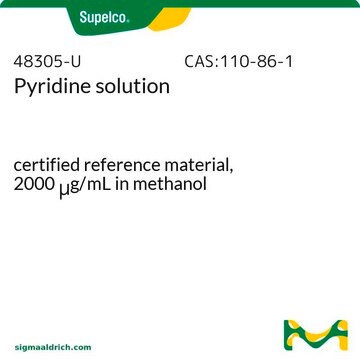33553
Pyridine
puriss. p.a., ACS reagent, reag. Ph. Eur., ≥99.5% (GC)
About This Item
Recommended Products
grade
ACS reagent
puriss. p.a.
Quality Level
Agency
reag. Ph. Eur.
vapor density
2.72 (vs air)
vapor pressure
10 mmHg ( 13.2 °C)
20 mmHg ( 25 °C)
Assay
≥99.5% (GC)
form
liquid
autoignition temp.
899 °F
expl. lim.
12.4 %
impurities
≤0.0005% KMnO4 red. matter (as O)
≤0.002% ammonia (NH3)
≤0.002% non-volatile matter
≤0.01% piperidine (GC)
≤0.1% water (Karl Fischer)
≤0.2% 2-picoline (GC)
refractive index
n20/D 1.509 (lit.)
pH
8.5 (25 °C, 15.82 g/L)
bp
115 °C (lit.)
mp
−42 °C (lit.)
solubility
H2O: in accordance
density
0.978 g/mL at 25 °C (lit.)
anion traces
chloride (Cl-): ≤5 mg/kg
sulfate (SO42-): ≤5 mg/kg
cation traces
Al: ≤0.5 mg/kg
B: ≤0.02 mg/kg
Ba: ≤0.1 mg/kg
Ca: ≤0.5 mg/kg
Cd: ≤0.05 mg/kg
Co: ≤0.02 mg/kg
Cr: ≤0.02 mg/kg
Cu: ≤0.03 mg/kg
Fe: ≤0.1 mg/kg
Mg: ≤0.1 mg/kg
Mn: ≤0.02 mg/kg
Ni: ≤0.02 mg/kg
Pb: ≤0.1 mg/kg
Sn: ≤0.1 mg/kg
Zn: ≤0.1 mg/kg
SMILES string
C1=CN=CC=C1
InChI
1S/C5H5N/c1-2-4-6-5-3-1/h1-5H
InChI key
JUJWROOIHBZHMG-UHFFFAOYSA-N
Looking for similar products? Visit Product Comparison Guide
General description
Application
Signal Word
Danger
Hazard Statements
Precautionary Statements
Hazard Classifications
Acute Tox. 4 Dermal - Acute Tox. 4 Inhalation - Acute Tox. 4 Oral - Eye Irrit. 2 - Flam. Liq. 2 - Skin Irrit. 2
Storage Class Code
3 - Flammable liquids
WGK
WGK 2
Flash Point(F)
68.0 °F - closed cup
Flash Point(C)
20 °C - closed cup
Certificates of Analysis (COA)
Search for Certificates of Analysis (COA) by entering the products Lot/Batch Number. Lot and Batch Numbers can be found on a product’s label following the words ‘Lot’ or ‘Batch’.
Already Own This Product?
Find documentation for the products that you have recently purchased in the Document Library.
Customers Also Viewed
Our team of scientists has experience in all areas of research including Life Science, Material Science, Chemical Synthesis, Chromatography, Analytical and many others.
Contact Technical Service





